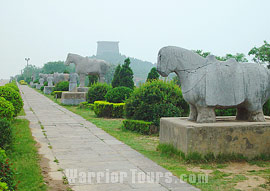Empress Wu Zetian

The only female monarch in Chinese history, Wu Zetian was the cairen, a fifth grade concubine of the Tang Dynasty (618 – 907)) of Emperor Taizong, and then ascended to empress of Emperor Gaozong, son of Emperor Taizong. She established the Zhou Dynasty which existed for 15 years from 690 to 705, with Luoyang as the capital. She was diligent in state affairs, which laid a foundation for the later 'Heyday of Kaiyuan' in Emperor Xuanzong's rule. She killed some senior and loyal ministers whom she suspected of disloyalty. She killed her daughter and son in order to gain the power she desired. Song Qingling, the second wife of the Chinese revolutionary leader Sun Yat-sen (Sun Zhongshan), praised her as the most outstanding woman politician in Chinese feudal society.
![]() Ascending to empress
Ascending to empress
Born in Wenshui County of Bingzhou State (Wenshui County, Shanxi Province), Wu Zetian was selected into the palace because of her beauty in 637, and conferred as cairen. Being beautiful, capable and apprehensive, Wu Zetian gained Emperor Taizong's favor a lot, and soon was given the name 'Meiniang' (an attractive girl). While, Concubine Xu at that time was even wiser than her, so Wu Zetian lost Emperor Taizong's favor later, but she got to know Li Zhi, the ninth son and successor of Emperor Taizong, luckily when Emperor Taizong was still alive.
In 649, Emperor Taizong died, and Wu Zetian and the other concubines were sent to Ganye Temple to be nuns. Later, Li Zhi inherited the throne with the emperor title 'gaozong'. The next year, Li Zhi went to Ganye temple to offer incense on the anniversary of Emperor Taizong's death. Wu Zetian seized the opportunity well. She reminded Li Zhi of their history and affection. Because of her beauty, Li Zhi prepared to take her to the palace. At that time, Empress Wang and Concubine Xiao were fighting for Emperor Gaozong's favor. Thus, Empress Wang supported Emperor Gaozong in bringing Wu Zetian back to the palace in order to win Emperor Gaozong's favor. After returning to the palace, Wu Zetian respected Empress Wang out of gratitude in the beginning, and Emperor Gaozong and Empress Wang were both pleased by her good service. As a result, she was promoted to Zhaoyi, the highest ranking of the nine concubines of the second rank in the Tang palace.
Later, Wu Zetian helped Empress Wang to have Concubine Xiao deposed down to a commoner. Thereafter, Empress Wang became the only threat to her, so Wu Zetian planned to get rid of her. Wu Zetian's second child was a very lovely daughter. Because Empress Wang didn't have a child, she was very fond of the baby girl, and often came to visit the baby. When Emperor Gaozong was coming, Empress Wang left quietly. One day, soon after Empress Wang left, Wu Zetian choked her daughter to death, and covered the baby well. When Emperor Gaozong came, she pretended to welcome him with smiles. Then, when she saw their daughter, Wu Zetian burst into tears. There is a famous saying in China, 'All men, good or bad, rarely ill treat their own children.' Wu Zetian naturally was not suspected of killing her daughter. Therefore, Empress Wang, who visited the baby minutes before must be the murderer. Thinking of that, Emperor Gaozong was very angry and decided to depose Empress Wang. However, deposing an empress required the agreement of the senior ministers. Emperor Gaozong's decision was strongly opposed by Zhangsun Wuji, brother of Emperor Gaozong's mother, and Prime Minister Chu Suiliang. To gain the favor of Wu Zetian, Minister Li Yifu and Xu Jingzhong took the other side. They said to Emperor Gaozong that the deposing and conferring of an empress were the household affairs of an emperor, so there was no need to consult with the ministers. At the same, time, they also lobbied the ministers to support Wu Zttian. In 655, Wu Zetian was finally installed as empress, and Empress Wang and Concubine Xiao were both cruelly tortured to death.
![]() Ascending to the throne
Ascending to the throne
After ascending to empress, Wu Zetian began again to prepare for her dream of being a woman ruler of the state. In the beginning, she made use of her identity as empress and the favor of Emperor Gaozong to participate in the state affairs and had Zhangsun Wuji and Chu Suiliang deposed. By doing so, she extended her influence and power and cleared the barriers on her way forward.
In 660, Emperor Gaozong fell ill and his eyesight became very weak, so he committed the state affairs to Wu Zetian. Thereafter, Wu Zetian gradually appropriated the real power of the Tang court. Later, Emperor Gaozong attempted to withdraw the state power, and ordered Shangguan Yi, a senor minister of Zhongshu Sheng (the legislative department), to draft a decree to depose Wu Zetian secretly. When she heard the news, Wu Zetian hurriedly executed Shangguan Yi before Emperor Gaozong started his action. Then, she began to move to the forefront, receiving the worship of the ministers and Emperor Gaozong. In 674, Emperor Gaozong and Wu Zetian were respectively entitled 'heavenly emperor' and 'heavenly empress' and the two together were named 'two saints'. After that, Emperor Gaozong became a puppet, and Wu Zetian had had all the power in her own hands.
Later, to clear the last barriers to her power, Wu Zetian killed her eldest and second sons, deposed her third son, and put her fourth son under house arrest. Meanwhile, she proclaimed the family name 'Wu' to be the first grade among all the family names to raise Wu Family's position in the society. She changed the name of Luoyang into 'Shendu' (heavenly capital) to prepare for ascending the throne.
When everything was ready, Wu Zetian proclaimed herself 'Shengshen emperor' in 690 at the age of 67, and changed the state title into 'Zhou'. After achieving her ruler's dream, Wu Zetian paid great attention to selecting and utilizing talented people. She pulled many excellent people into her administration. In addition, she initiated systems of final imperial exams and military exams. She also attached great importance to agricultural production. She often demoted and even dismissed many local officials who squeezed the people with heavy taxes. On the border, she reoccupied four towns of Anxi (Anxi County of Gansu Province), set up the Beiting Govermment Office in Tingzhou (Jimusaer county of Xinjiang Uyghur Autonomous Region) to solidify the northwestern border, and re-opened the ' Silk Road' leading to Middle Asia.
However, she also appointed cruel ministers who butchered many innocent officials and people. She selected many competent people and appointed them as officials, so government administrations swelled quickly. She always craved greatness and success, and lived a luxurious life. As a result, people became more and more disenchanted. In 705, Zhang Jianzhi, the Prime Minister, seized the opportunity to acclaim Zhongzong, the third son of Emperor Gaozong and Wu Zetian, as emperor when Wu Zetian was old and ill. In the winter of the same year, Wu Zetian died of illness at the age of 82, 16th of December 705 A.D. Before her death, Wu Zetian ordered her monarch title removed, and requested burial in the Qian Mausoleum with Emperor Gaozong.

